The European Commission believes political advertising on the internet should be more regulated in the future, said Věra Jourová, vice-president of the European Commission, in an interview with the German Welt am Sonntag weekly. The left-wing European politician added that in a few weeks, she would present new rules that she claims would bring order to the world of political advertising.
“Today, digital advertising for political purposes is an uncontrolled competition of dirty and opaque methods,” Jourová said.
“Attempts to influence elections or the election process must abide by stricter rules, which will also guarantee significant transparency,” Jourová emphasized in the interview.
In this context, Jourová pointed to a new Eurobarometer survey, according to which four out of ten Europeans stated that they did not know whether certain online content was a part of political advertising.
“We cannot accept that. Citizens need to know why they receive election ads, who paid for them, and what data is used to address political advertising to certain people,” said Jourová.
She says the new European rules will address these issue, and in particular, it will ensure that sensitive data exchanged among friends on social media platforms will not be used for political purposes. This data includes information about sexual orientation, religion, or political opinion.
“We know that such data is used today — or rather misused — to search for target groups for political advertising,” said the vice-president of the European Commission.
According to the Welt am Sonntag, the EU rules should focus mainly on companies that deal with data analysis and that compile psychological profiles based on “likes” on social media, orders of goods, or other personal data. According to Jourová, it is not only about Meta, which operates Facebook or Instagram, and Google, but also Cambridge Analytica and other companies. Despite her reference to Cambridge Analytica, the firm has been defunct since 2018.





